
Blackjack is a casino banking game. It is the most widely played casino banking game in the world. It uses decks of 52 cards and descends from a global family of casino banking games known as "twenty-one". This family of card games also includes the European games vingt-et-un and pontoon, and the Russian game Ochko. The game is a comparing card game where players compete against the dealer, rather than each other.

Red dog, also known as Yablon and Scottish Foghorn, is a game of chance played with cards, in which two cards are dealt and a player bets on whether the rank of a third card would fall between them. While found in some land casinos, its popularity has declined, although it is featured at many online casinos.
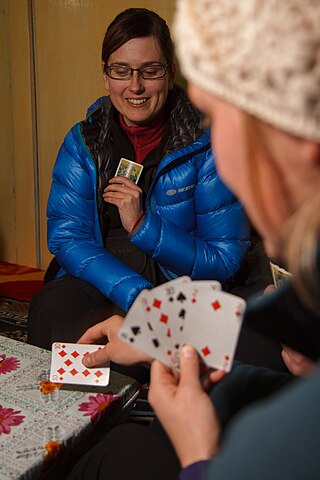
President is a shedding card game for three or more, in which the players race to get rid of all of the cards in their hands in order to become "president" in the following round. It is a Westernized version of Chinese climbing card games such as Zheng Shangyou, Tien Len in Vietnam and the Japanese Daifugō.

Eleusis is a shedding-type card game where one player chooses a secret rule to determine which cards can be played on top of others, and the other players attempt to determine the rule using inductive logic.

Card Sharks is an American television game show. It was created by Chester Feldman for Mark Goodson-Bill Todman Productions. Contestants attempt to predict the outcome of survey questions to gain control of a row of oversized playing cards, then determine whether the next card drawn is higher or lower. The title Card Sharks is a play on the term "card sharp", a person skilled at card games.

Kings is a drinking game using playing cards. Players must drink and dispense drinks based on cards drawn. The cards have predetermined drink rules prior to the game's beginning. Often groups establish house rules with their own game variations.
The game of Bartok, also known by a number of other names, such as Wartoke, Warthog, Bartog, Bentok, Last One Standing or Bong 98, is a card game popular in Australia where the winner of each round invents a new rule which must be obeyed for the remainder of the game. It belongs to the "shedding" or Eights family of card games, whereby each player tries to rid themselves of all of their cards. The game progresses through a series of rounds with a new rule being added in each round, thus making the game increasingly complex as it progresses. These newly introduced rules may modify any existing rules.
Pitch is an American trick-taking game equivalent to the British blind all fours which, in turn, is derived from the classic all fours. Historically, pitch started as "blind all fours", a very simple all fours variant that is still played in England as a pub game. The modern game involving a bidding phase and setting back a party's score if the bid is not reached came up in the middle of the 19th century and is more precisely known as auction pitch or setback.

Craits is a shedding card game for two to five players derived from Crazy Eights, which forms the origin of its name. Accounts of the game's origin are unclear, with some sources alleging it was created in the late 1960s in Chicago, Illinois and others in the 1970s in Cambridge, Massachusetts.
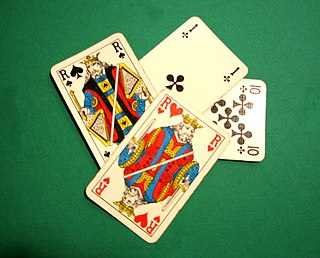
Clabber is a four-player card game played in southwestern Indiana near Evansville. It is a member of the Jack–nine family of point-trick card games that are popular in Europe and is similar to Klaberjass. The trump makers must score at least eighty-two points to keep from "going set", where they do not score any of their points. Additional points can also be scored for a combination of cards in a hand, which would assist in "making it", or, not going set.

Daifugō or Daihinmin, also known as Tycoon, is a Japanese shedding-type card game for three or more players played with a standard 52-card pack. The objective of the game is to get rid of all the cards one has as fast as possible by playing progressively stronger cards than those of the previous player. The winner is called the daifugō earning various advantages in the next round, and the last person is called the daihinmin. In that following round, winners can exchange their one or more unnecessary cards for advantageous ones that losers have.
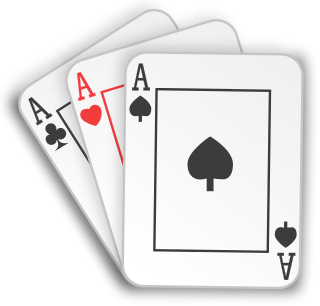
Teen patti is a gambling card game. Teen Patti originated in India and is popular throughout South Asia. It originated in the English game of three-card brag, with influences from poker. It is also called flush or flash in some areas.

Twenty-eight is an Indian trick-taking card game for four players, in which the Jack and the nine are the highest cards in every suit, followed by ace and ten. It thought to be descended from the game 304, along with similar Indian games known as "29", "40" and "56".
304, pronounced three-nought-four, is a trick-taking card game popular in Sri Lanka, coastal Karnataka, Tamil Nadu and Maharashtra, in the Indian subcontinent. The game is played by two teams of two using a subset of the 52 standard playing cards so that there are 32 cards in play.
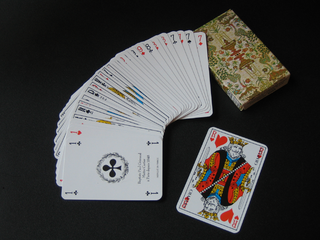
Manille is a Catalan French trick-taking card game which uses a 32 card deck. It spread to the rest of France in the early 20th century, but was subsequently checked and reversed by the expansion of belote. It is still popular in France and the western part of Belgium.
Draw poker is any poker variant in which each player is dealt a complete hand before the first betting round, and then develops the hand for later rounds by replacing, or "drawing", cards.
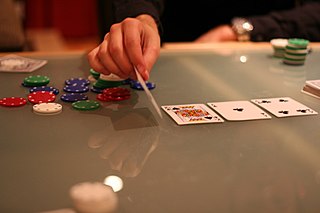
Community card poker refers to any game of poker that uses community cards, which are cards dealt face up in the center of the table and shared by all players. In these games, each player is dealt an incomplete hand face down, which are then combined with the community cards to make a complete hand. The set of community cards is called the "board", and may be dealt in a simple line or arranged in a special pattern. Rules of each game determine how they may be combined with each player's private hand. The most popular community card game today is Texas hold 'em, originating sometime in the 1920s.

Julepe, , is a gambling card game of Spanish origin, similar to the English five-card Loo, and best for six players. It spread rapidly across the Spanish-American countries during the 19th century.
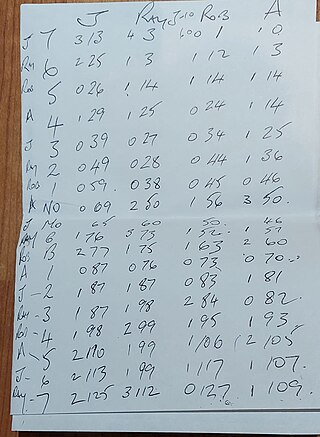
Clag is a trick-taking card game using a standard pack of 52 French-suited playing cards. It is similar to oh hell, and can be played by three to seven players. Clag originated in the Royal Air Force and started as an acronym for Clouds Low Aircraft Grounded.














